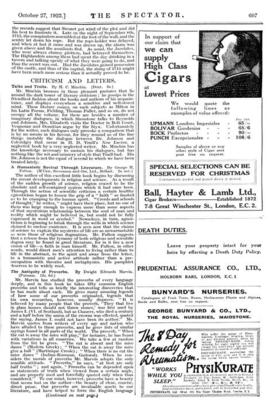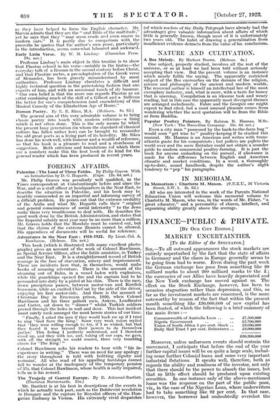The Antiquity of Proverbs. By Dwight Edwards Marvin. (Putnam. 12s.
6d.) The Antiquity of Proverbs. By Dwight Edwards Marvin. (Putnam. 12s. 6d.)
Mr. Marvin has studied the proverbs of every language deeply, and in this book he takes fifty common English proverbs and tells us briefly the interesting discoveries that he has made about each. He gives many amusing legends of how some of our proverbs originated, legends that his own researches, however, usually disprove. " It is believed by many people that the proverb, They that live in glass houses should not throw stones,' was first used by James I. (VI. of Scotland), but as Chaucer, who died a century and a half before the union of the crowns was effected, quoted the saying, James I. could not have been its author." Mr. Marvin quotes from writers of every age and nation who have alluded to these proverbs, and he gives lists of similar sayings found in all parts of the world. The proverb, " When the cat is away the mice will play," for instance, he has found with variations in all countries. We- take a few at random from the list he gives. " The cat is absent and the mice dance " (Modern Greek) ; " When the cat is away the mice give a ball " (Martinique Creole) ; " When there is no cat the mice dance ' (Indian-Kumaun, Garhwal). When he con- siders the morals of proverbs Mr. Marvin adopts the only sensible attitude. " Proverbs," he says, " at best are only half truths " ; and again, " Proverbs can be depended upon as statements of truth when viewed from a certain angle, and are properly used and forcefully quoted only when thus considered. To our mind, however' proverbs have a beauty that seems lost on the author—the beauty of clear, concise, direct prose. Our proverbs are invaluable assets to our literature, and have helped to form the English language (Continued on next page.) as they have helped to form the English character. Mr. Marvin admits that they arc the " oral Bible of the multitude," yet he says that they " may seem crude and even coarse to modern ears." It is partly due to comparison with the proverbs he quotes that the author's own prose, particularly in the introduction, seems somewhat laboured and awkward. Early Latin Verse. By W. M. Lindsay. (Clarendon Press.















































 Previous page
Previous page